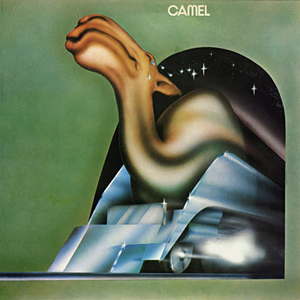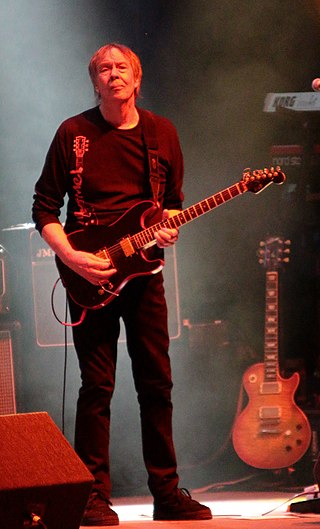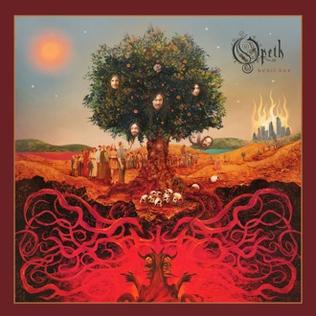
Opeth are a Swedish progressive metal band from Stockholm, formed in 1990. The band incorporates folk, blues, classical, and jazz elements into its usually lengthy compositions, as well as strong influences from death metal, especially in their early works. Songs may include acoustic guitar passages, Mellotrons, death growls, and strong dynamic shifts.

Lars Mikael Åkerfeldt is a Swedish musician. He is the lead vocalist, guitarist, and primary songwriter of progressive metal band Opeth. A former vocalist of death metal supergroup Bloodbath, he was also guitarist for the "one-off" band Steel, and part of the collaboration Storm Corrosion with Steven Wilson.

Damnation is the seventh studio album by Swedish progressive metal band Opeth. It was released on 22 April 2003, five months after Deliverance, which was recorded at the same time. Damnation is the last Opeth album to date to be produced by Steven Wilson although he did mix two future albums, Heritage and Pale Communion. Mikael Åkerfeldt dedicated both Damnation and Deliverance to his grandmother, who died in a car accident during the time the albums were being recorded.

Andrew John Ward is an English progressive rock drummer.

Mirage is the second studio album by the English progressive rock band Camel, released on 1 March 1974. It features songs such as "The White Rider", "Lady Fantasy", and "Supertwister" which includes a showcase for Andrew Latimer's flute.

Camel is the debut studio album by English progressive rock band Camel, released in February 1973 by MCA Records.

Peter Bardens was an English keyboardist and a founding member of the progressive rock group Camel. He played keyboards, sang, and wrote songs with Andrew Latimer. During his career, Bardens worked alongside Rod Stewart, Peter Green, Mick Fleetwood and Van Morrison. He recorded eleven solo albums.

Ghost Reveries is the eighth studio album by Swedish progressive metal band Opeth. It was released on 29 August 2005. It was their first album after signing with Roadrunner Records, and first album since Still Life (1999) to not be produced by Steven Wilson.

Moonmadness is the fourth studio album by English progressive rock band Camel. It was released in April 1976 on Decca and Gama Records and is their last album recorded by the group's original line-up of Andrew Latimer, Peter Bardens, Doug Ferguson, and Andy Ward. After reaching success with their previous album, the all-instrumental The Snow Goose, the band started on a follow-up and incorporated vocals and lyrics to the new music. Moonmadness has a loose concept with one track based on the personality of each band member: "Air Born" for Andrew Latimer, "Chord Change" for Peter Bardens, "Another Night" for Doug Ferguson, and "Lunar Sea" for Andy Ward. In 2018, 42 years after its release, Camel performed the album live in its entirety.

The Snow Goose is the third studio album by the band Camel, released in 1975. The critical success of "The White Rider" suite inspired the group to write more novel-inspired conceptual suites.

Andrew Latimer is an English musician and composer. He is a founding member of the progressive rock band Camel and the only member who has been with them since their formation in 1971. Although he is best known as a guitarist and singer, Latimer is also a flautist and keyboardist.

Breathless is the sixth studio album by the English progressive rock band Camel, released in 1978. It is the last album to feature the group's original keyboardist, Peter Bardens, who left the group before the tour for the album.

The Snow Goose: A Story of Dunkirk is a novella by the American author Paul Gallico. It was first published in 1940 as a short story in The Saturday Evening Post, after which he expanded it to create a short novella which was published on 7 April 1941.

A Live Record is the first live album by the progressive rock band Camel, released in 1978. It is a double LP, composed of recordings from three different tours.

Pressure Points: Live in Concert is a live album by progressive rock band Camel, released in 1984. A remastered version with six bonus tracks was released in 2009 as a double CD Set.

In Live Concert at the Royal Albert Hall is the third live album and video by Swedish progressive metal band Opeth. The DVD was recorded on 5 April 2010. It was released on 20 September 2010 in Europe and on 21 September 2010 in the rest of the world. The concert was part of the band's Evolution XX: An Opeth Anthology tour, made in celebration of their 20th anniversary, and was the fourth show of the tour, filmed at the prestigious Royal Albert Hall in London, UK.
Storm Corrosion was a musical collaboration between Swedish musician Mikael Åkerfeldt of progressive metal band Opeth and English musician Steven Wilson of the progressive rock band Porcupine Tree. Åkerfeldt and Wilson began a longstanding musical partnership in 2001 when Wilson produced Opeth's fifth studio album Blackwater Park. The two began writing together for a new project in 2010, releasing their self-titled only studio album in 2012 through Roadrunner Records.

Heritage is the tenth studio album by Swedish progressive metal band Opeth. It was released on 13 September 2011 through Roadrunner Records. The album was recorded in early 2011 at Atlantis Studios in Stockholm and produced by Mikael Åkerfeldt, engineered by Janne Hansson, and mixed by Steven Wilson. It takes on more of a progressive rock sound, something the band had wanted to do for some time. It is a stark contrast to the progressive death metal sounds of their past albums.



















